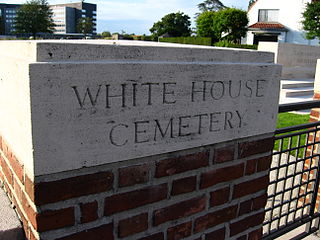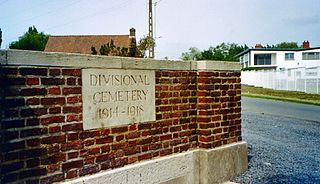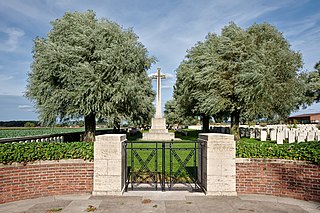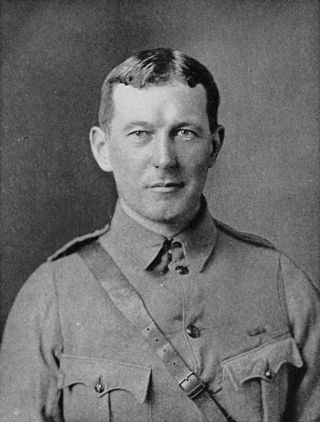
Larch Wood Cemetery is a Commonwealth War Graves Commission (CWGC) burial ground for the dead of the First World War located in the Ypres Salient on the Western Front in Belgium.

Ypres Reservoir Cemetery is a Commonwealth War Graves Commission (CWGC) burial ground for the dead of the First World War located in the Ypres Salient on the Western Front.

Ramparts Cemetery (Lille Gate) is a Commonwealth War Graves Commission (CWGC) burial ground for the dead of the First World War located in the Ypres Salient on the Western Front.

Duhallow ADSCemetery is a Commonwealth War Graves Commission burial ground for the dead of the First World War located near Ypres on the Western Front in Belgium.

Hooge Crater Cemetery is a Commonwealth War Graves Commission burial ground for the dead of the First World War located in the Ypres Salient in Belgium on the Western Front. Hooge Crater Cemetery is named after a mine crater blown nearby in 1915 and located near the centre of Hooge, opposite the "Hooge Crater Museum" and separated from it by the Menin Road. Hooge itself is a small village on the Bellewaerde Ridge, about 4 kilometres east of Ypres in the Flemish province of West Flanders.

Spoilbank is a Commonwealth War Graves Commission burial ground for the dead of the First World War located in the Ypres Salient on the Western Front.

White House Cemetery is a Commonwealth War Graves Commission (CWGC) burial ground for the dead of the First World War located in the Ypres Salient on the Western Front in Belgium.

Divisional Cemetery is a Commonwealth War Graves Commission burial ground for the dead of the First World War located in Vlamertinge at Ypres on the Western Front in Belgium.

Bedford House Cemetery is a Commonwealth War Graves Commission burial ground for the dead of the First World War located near Zillebeke, itself near Ypres, on the Western Front in Belgium.

Menin Road South Military Cemetery is a Commonwealth War Graves Commission burial ground for the dead of the First World War located near Ypres, on the Western Front.

Godezonne Farm Cemetery is a Commonwealth War Graves Commission (CWGC) burial ground for the dead of the First World War located in the Ypres Salient on the Western Front in Belgium.

Klein Vierstraat British Cemetery is a Commonwealth War Graves Commission (CWGC) burial ground for the dead of the First World War located in the Ypres Salient on the Western Front in Belgium.

Blauwepoort Farm is a Commonwealth War Graves Commission burial ground for the dead of the First World War located near Ypres in Belgium on the Western Front.

New Irish Farm Cemetery is a Commonwealth War Graves Commission burial ground for the dead of the First World War located near Ypres in Belgium on the Western Front.

PerthCemetery is a Commonwealth War Graves Commission burial ground for the dead of the First World War located near Ypres (Ieper) in Belgium on the Western Front.

Woods Cemetery is a Commonwealth War Graves Commission burial ground for the dead of the First World War located near The Bluff south of Ypres (Ieper) in Belgium on the Western Front.

Spanbroekmolen British Cemetery is a Commonwealth War Graves Commission (CWGC) burial ground for the dead of the First World War located in the Ypres Salient on the Western Front in Belgium. It is located at Spanbroekmolen, on one of the highest points of the Messines Ridge.

Essex Farm Cemetery is a World War I, Commonwealth War Graves Commission burial ground within the John McCrae Memorial Site near Ypres, Belgium. There are 1,204 dead commemorated, of which 104 are unidentified. The cemetery was designed by Sir Reginald Blomfield and has an area of 6,032 square metres (64,930 sq ft).

Buttes New British Cemetery is a Commonwealth War Graves Commission burial ground for the dead of the First World War located in the Ypres Salient in Belgium on the Western Front.

Site John McCrae is a World War I memorial site near Ypres, Belgium. It is named after the Canadian physician Lieutenant Colonel John McCrae, MD (1872–1918), author of the famous poem "In Flanders Fields", which he composed while serving at this site in 1915.























